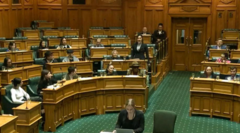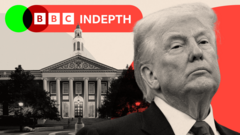Elon Musk has come forward with scathing criticism of President Trump's major tax and spending bill, calling it a "disgusting abomination" and signaling deepening divisions within the GOP regarding its implications for the economy.
Musk's Dissent: A Divided GOP Amid Trump's Tax Bill Debate

Musk's Dissent: A Divided GOP Amid Trump's Tax Bill Debate
Elon Musk's criticism of Trump's tax plan highlights growing rifts within the Republican Party.
In a stunning turn of events, tech billionaire Elon Musk has publicly torn into President Donald Trump's flagship tax and spending bill, dubbing it a "disgusting abomination." His remarks have ignited conversations about the widening rift within the Republican Party over Trump's economic plans. The controversial budget, laden with multi-trillion dollar tax breaks and an increase in defense spending, has been passed by the House of Representatives, but not without opposition.
Taking to X, Musk expressed his disdain for the bill, stating, "Shame on those who voted for it." This marks Musk's first notable dispute with Trump since resigning from the administration after a brief tenure aimed at reducing operational costs. While he previously referred to the bill as "disappointing," his latest comments signal a shift in his stance.
The legislation, which Trump himself praises as the "big beautiful bill," is projected to escalate the federal budget deficit by approximately $600 billion for the upcoming fiscal year. Musk voiced concerns over the bill's extensive provisions, warning that it could inflate the budget deficit to a staggering $2.5 trillion and burden American citizens with unsustainable debt.
After expressing his concerns, Musk reiterated a political warning: "In November next year, we fire all politicians who betrayed the American people." Following Musk's remarks, White House Press Secretary Karoline Leavitt responded by affirming the administration's support for the legislation, insisting it remains a priority for Trump.
The bill also aspires to extend tax cuts enacted during the first Trump administration and facilitate increased borrowing, raising the debt ceiling to $4 trillion. Such moves have drawn stark criticism from fiscal conservatives within the GOP, leading to tensions among various factions as the bill progresses in the Senate.
As dissent grows, figures like Senator Rand Paul have voiced outright opposition to the bill if it raises the debt ceiling, warning that the GOP will bear the repercussions of increased debt. In a surprising retort, Trump criticized Paul, claiming he misunderstood the bill and that constituents in Kentucky would be displeased with his stance.
Republican leadership, however, appears resolved to press on with the bill irrespective of Musk's criticisms. Senate Majority Leader John Thune maintained a firm stance: "We have an agenda that everybody campaigned on," asserting the party's intention to stay the course.
In an effort to bridge gaps with fiscal conservatives, Trump is also pressuring Congress to approve a reduction of current spending by $9.4 billion, a figure influenced by Musk's previous initiatives. This reduction is expected to target foreign aid and funding for public broadcasting outlets such as NPR and PBS.
As July 4th looms as a deadline for lawmakers to pass the bill, Musk's criticisms signal more than just a personal disagreement; they underscore the brewing complications the GOP faces as party unity is tested amid contentious policies.



















